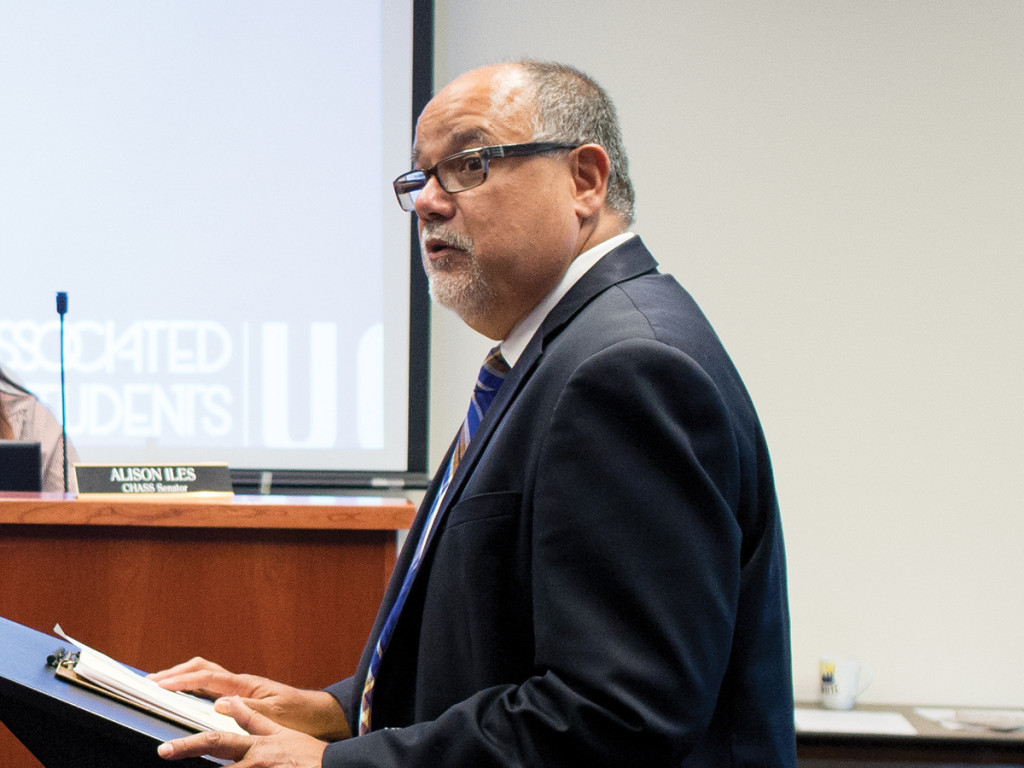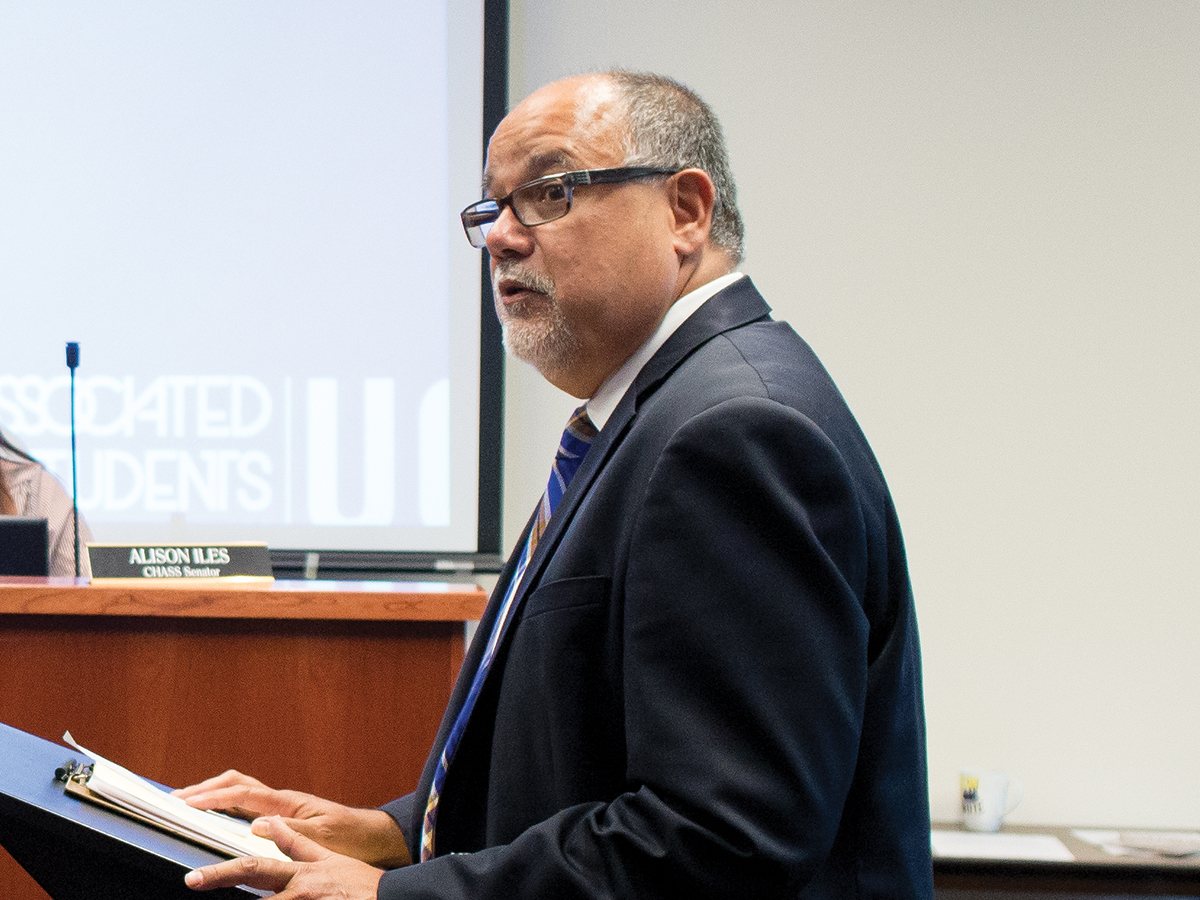
What’s the situation between ASUCR and UCR campus administration?
Before an opinion is offered on the situation, we believe it is ultimately beneficial for the readers’ understanding and for the editorial’s quality that a detailed summary is given.
On Oct. 19, 2015, four members of the ASUCR Executive Cabinet, President Ashley Harano, Vice President of Internal Affairs Michael Ervin, Vice President of External Affairs Mohamed “Momo” Hussein and Vice President of Finance Shafi Karim, were sent a three-paragraph email from the office of Chancellor Kim Wilcox that asked for a “reporting relationship” to begin between the executive director of ASUCR and a person within the Division of Student Affairs (VCSA) by December 1, 2015. Essentially, the Office of the Chancellor (which shall also be called UCR campus administration from now on) requested — or ordered, depending on how one read the email’s language or wording in the second paragraph — to have oversight of ASUCR’s executive director, who consist of professional employees that are not students of UCR.
For reference, the second paragraph of Chancellor Wilcox’s email was the following: “This letter will also confirm my instruction that the Executive Director of ASUCR (and other professional staff) shall report to a person within the Division of Student Affairs (VCSA). That reporting relationship shall begin December 1, 2015. Please work with Vice Chancellor James Sandoval and Campus Counsel David Bergquist over the next several weeks to make a recommendation to me by November 10, 2015 regarding the appropriate person within VCSA to whom the Executive Director of ASUCR shall report.”
Due to the language and brevity of said email, President Harano engaged with the services of the Law Offices of Reid & Hellyer’s Attorney Scott Talkov to carry out a fact-finding investigation to ascertain the legal and factual basis for UCR campus administration.
Currently, no final action has been carried out by either members of ASUCR or UCR campus administration in regards to this situation. The most definitive one is that Chancellor Wilcox has lifted the deadline for when the “reporting relationship” between VCSA and the Executive Director of ASUCR is to begin.
As of the publication of this editorial, a joint-letter by Attorney Talkov and Counsel Bergquist is planned to be produced and presented during an ASUCR Senate open-session sometime during the coming 2015-2016 Winter Quarter.
What does ASUCR think or feel about the situation?
Based on interviews with a few ASUCR members, it can be demonstrated that there is a variety of interpretations and perspectives on the October email from Chancellor Wilcox that requested for oversight over the executive director of ASUCR. To protect these members’ opinions, their names nor their specific quotes will be given — except for one member’s, due to the permission he gave the Highlander Editorial Board.
When asked how they felt about the initial email, some ASUCR members stated that they felt shocked due to the rather suddenness of UCR administration’s request for oversight that was not initially explained. The language of the email came off as a direct or straight-forward order that would not be open to compromise, which unsettled members of ASUCR. Though further communication from UCR administration stated that they wish to — to quote the aforementioned letter Counsel Bergquist wrote in response to the fact-finding report — reach “an agreement which respects ASUCR autonomy and University Policy,” the ASUCR members that were interviewed still spoke about concerns about the ambiguity of the request for oversight, such as why oversight has been requested.
The effects of this ambiguity were evident when the interviewed ASUCR members noted the possible reasons for this oversight. It could have been asked due to the number of projects that ASUCR conducts, such as R’Pantry or R’Closet, which may require additional accountability. It could have been asked due to the chancellor’s UCR expansion plan in order to allow easier passage of proposed changes without ASUCR interference. It could have been due to the controversies surrounding the ASUCR elections last spring, where administration stepped in to mediate. It could have been the fact that the ASUCR presidents do not have proper human resource management training to oversee non-student, professional staff like the executive director, according to UCR administration.
Beyond these differing cited reasons, all the interviewed members of ASUCR stated that they wish to continue further communication and transparency between ASUCR and UCR administration, because of the ambiguity running rampant and the partnership needed between the two entities for the sake of maintaining all UCR students’ best interests. All voiced that there is not enough understanding of the situation from both parties to make a final decision.
However, some of the interviewed members stated that they wish for an oversight committee consisting of members from ASUCR and UCR administration be formed in order to reach a compromise. Some reasoned that this should be done for the sake of protecting ASUCR’s autonomy from campus administration. Others reasoned that this should be done to reach a middle-ground, such as the ability for UCR administration can have oversight over the executive director and professional staff if they were to help pay for said staff’s salaries that amount to $300,000 (which ASUCR currently pays in full).
As Ervin stated in this his interview when asked what he wishes for administration to do in light of the situation: “Just be open and honest. That’s all we ask.”
What does the Highlander editorial board think or feel about the situation?
Despite possessing the fact-finding report and Bergquist’s letter, we are still left with too much ambiguity about the reasoning behind the request for oversight of the executive director and professional staff. There are still too many questions that were left unanswered without clarity in position and information, such as: why request oversight now? Will UCR administration pay in full or part of the professional staff’s salaries if they receive oversight? Who is asking for this oversight specifically?
Though we understand that this ambiguity may be natural when discussions are still being had, the situation has been detrimental to how UCR administration is viewed in terms of its care for students’ interests. Though Talkov stated “Vice Chancellor of Student Affairs James Sandoval confirmed that he has not requested this power to oversee ASUCR” in his fact-finding report and Bergquist stated Chancellor Wilcox does not wish to encroach on ASUCR’s autonomy, the wording and information of the written responses from UCR administration gave off the impression that they do not respect ASUCR. Wilcox’s push for oversight came off as an aggressive move by administration that would not be open to compromise or discussion with ASUCR. It read off as an order for oversight instead of a discussion for oversight. Furthermore, as Ervin recounts: “we have written text of arguments, we have written text of responses, we have not had a Q & A amongst the (ASUCR) Senate to ask specifically details that have gone unanswered.”
Even if this has been a bit more clarified with the documents produced by Talkov and Bergquist, this initial feeling of aggression interpreted from Wilcox’s letter has done its damage. Due to this, we are left questioning UCR administration’s motives for oversight with reasons varied and ranging as the ones mentioned by the interviewed ASUCR members.
This shouldn’t be the case. The initial letter should not have been a mere three-paragraph email. It should have been asking for an open discussion about UCR administration oversight over the executive director of ASUCR and professional staff. Even if UCR administration is not asking for oversight over ASUCR, but only its professional staff, what matters is that it came off as the former due to their approach to communication.
What should ASUCR do now about the situation?
Despite the ambiguity or wariness surrounding whether UCR administration desires oversight over ASUCR, our student body government should continue communication and transparency with them in order to come to a compromise. No decisive action should be taken until clarity has been reached on both sides. Or else, this can cause disastrous results that may jeopardize both entities’ image and power, just because of a simple miscommunication issue. Informed decisions are required for any structural changes within any governing body.
If campus administration justifies oversight over professional staff is needed due to HR training or accountability, then ASUCR should discuss these issues as they have been problematic in the past or could be in the future.
However, if UCR administration seeks oversight over ASUCR through the professional staff (though that itself would be hard to do as the executive director does not have control over ASUCR), then ASUCR should assert their rights to autonomy. Any violation of ASUCR’s autonomy would jeopardize student’s rights and interests, which should be protected and upheld no matter the issue.
Why should administration be transparent?
Beyond the duty that they have to students as a public entity that is funded by student fees, UCR administration needs to be transparent to make it apparent that they do have UCR students’ interests in mind. When there is no transparency or communication from any governing body, doubt can be formed on said body’s intentions. This is what occurred and is still occurring with how some view their request for oversight over the executive director of ASUCR.
As UCR administration, they must rectify these acts of miscommunication, so further steps can be taken to reach a compromise or middle-ground. This can be accomplished by either proceeding with a Q-and-A in front of ASUCR senate or an oversight committee consisting of members from both entities. Anything that engages both ASUCR and UCR administration in direct, face-to-face dialogue instead of just written words.
In addition, such engagements should be informed to the students, especially once a compromise has been made. With any restructuring of a governing body — especially the government that serves as a voice of all UCR students — it should be announced to the public, so they can voice their say throughout the discussions between UCR administration and ASUCR instead of merely at the end of the discussion
What can students do?
With all this said, students should be informed with any coming decisions that arise as any discussion regarding UCR administration’s request for oversight on ASUCR professional staff continues. It is our right as students to know what decisions are being made by the people who are paid by our fees. Furthermore, it is our duty as UCR students to not just be knowledgeable, but also active in our participation at our university. Attend ASUCR meetings, provide comments during public forums, read up on the situation from all sides involved, visit your ASUCR senators to understand their opinions, send emails to the UCR administration to ask of theirs, try to understand how oversight has been conducted at other UC campuses.
However do not merely be passive if you fully disagree with a decision proposed by ASUCR and UCR administration after arriving to an educated understanding of this situation. Voice your dissent (or agreement) via protest or social media. Let your voices be heard, because students have the right to transparent entities.
We also invite anyone from the community to submit a letter to the editor if they wish to respond to this editorial no matter, whether to retort or contribute.








